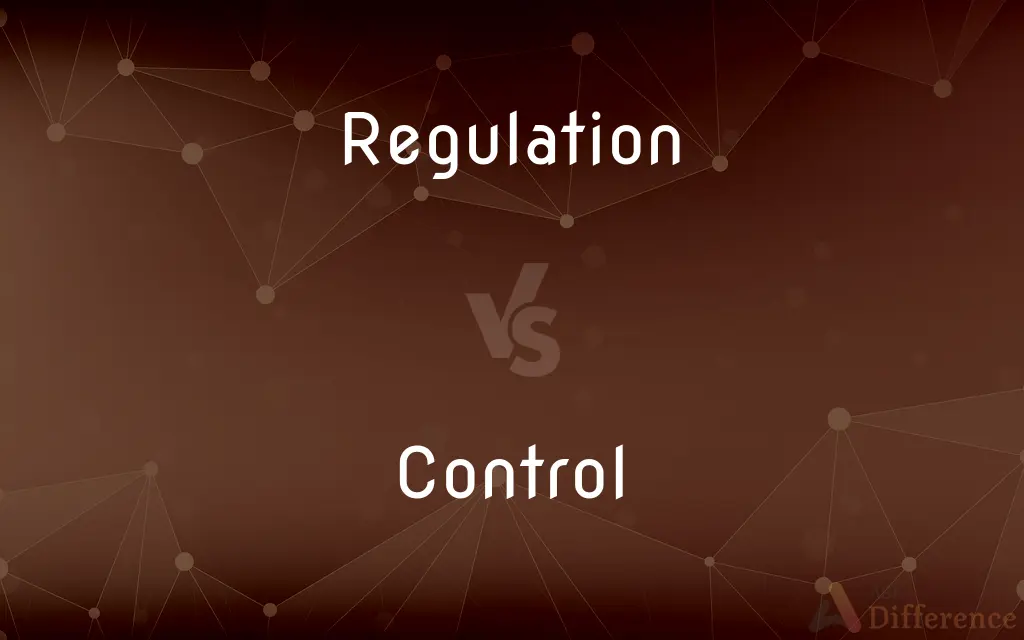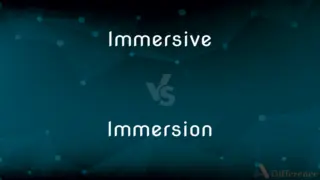Regulation vs. Control — What's the Difference?
By Tayyaba Rehman & Maham Liaqat — Updated on March 11, 2024
Regulation involves setting standards and rules to govern behavior, while control is the direct influence or management of activities to ensure compliance or achieve objectives.

Difference Between Regulation and Control
Table of Contents
ADVERTISEMENT
Key Differences
Regulation is the process of establishing guidelines, rules, or laws designed to manage the conduct of individuals, organizations, or systems. These regulations are often established by governmental bodies or regulatory agencies and aim to ensure fairness, safety, and consistency across various sectors. On the other hand, control refers to the exercise of power to manage, direct, or command people, resources, or systems, ensuring that activities are conducted according to certain standards or objectives. Control can be implemented by individuals or organizations through various mechanisms like policies, procedures, or direct supervision.
While regulation sets the framework within which entities operate, control is the mechanism through which the compliance with these regulations is ensured or through which specific objectives are achieved. Regulations provide the parameters for acceptable behavior or operations, whereas control involves the actual actions taken to adhere to these parameters or achieve desired outcomes. For instance, a regulation might limit the amount of pollutants a factory can emit, while control mechanisms would be the procedures and technologies the factory implements to meet these limits.
Regulations are typically enforced through penalties for non-compliance, such as fines, sanctions, or legal actions. These enforcement mechanisms aim to deter violations and encourage adherence to the established rules. Conversely, control mechanisms may include rewards or incentives for performance that meets or exceeds the set standards, in addition to penalties for failure to comply. This difference highlights the external versus internal nature of motivation and enforcement in regulation and control.
In the context of business, regulation often aims to protect consumers, preserve natural resources, ensure fair competition, and maintain market integrity. It can impose limits on business operations, product standards, and industry practices. Control, within a business context, focuses on achieving organizational goals, optimizing performance, and managing risk. It includes strategies and actions that businesses take internally to ensure they meet external regulations and their own standards.
Regulations are characterized by their broader impact on industries, markets, or societal norms, affecting multiple entities within a given domain. Control, however, is more specific to the entity exercising it and can be tailored to unique objectives, situations, or environments. This specificity allows for more direct and immediate influence on behavior or outcomes compared to the general and sometimes slower-moving nature of regulatory change.
ADVERTISEMENT
Comparison Chart
Definition
Establishing rules to govern behavior
Direct influence to manage activities
Purpose
Ensure fairness, safety, consistency
Achieve compliance, objectives
Enforcers
Governmental bodies, regulatory agencies
Individuals, organizations
Enforcement
Penalties for non-compliance
Penalties, rewards for compliance
Scope
Broad, impacting industries or society
Specific, tailored to entities
Example
Emission limits for factories
Implementation of technologies to meet emission standards
Focus
Setting parameters for operation
Actions to adhere to parameters
Compare with Definitions
Regulation
A rule or directive made and maintained by authority.
The new banking regulation aims to prevent financial crises.
Control
The power to influence or direct behavior or the course of events.
Effective control over resources maximizes profits.
Regulation
The process of organizing something according to rules.
The regulation of medical practices protects patients.
Control
A means of limiting or regulating something.
Quality control ensures product standards.
Regulation
Prescribed by or according to regulation;
Regulation army equipment
Control
A standard for comparison in scientific experiments.
The control group received no treatment.
Regulation
Official rules or orders that control how something is done.
Environmental regulations limit industrial pollution.
Control
The process of restraining or commanding influences.
Pest control measures are essential for crop protection.
Regulation
Adjustments to control operation or performance in machines.
The technician made some regulations to the heating system.
Control
The ability to manage operations or processes.
She has tight control over the project's budget.
Regulation
Regulation is the management of complex systems according to a set of rules and trends. In systems theory, these types of rules exist in various fields of biology and society, but the term has slightly different meanings according to context.
Control
The power to influence or direct people's behaviour or the course of events
The whole operation is under the control of a production manager
The situation was slipping out of her control
Regulation
A rule or directive made and maintained by an authority
Planning regulations
Control
A person or thing used as a standard of comparison for checking the results of a survey or experiment
Platelet activity was higher in patients with the disease than in the controls
Regulation
The action or process of regulating or being regulated
The regulation of financial markets
Control
A member of an intelligence organization who personally directs the activities of a spy
He sat with his KGB control as the details of his new assignment were explained
Regulation
The act of regulating or the state of being regulated.
Control
A high card that will prevent the opponents from establishing a particular suit
He has controls in both minor suits
Regulation
A principle, rule, or law designed to control or govern conduct.
Control
Determine the behaviour or supervise the running of
He was appointed to control the company's marketing strategy
Regulation
A governmental order having the force of law. Also called executive order.
Control
Take into account (an extraneous factor that might affect the results of an experiment)
No attempt was made to control for variations
Regulation
(Embryology) The capacity of an embryo to continue normal development following injury to or alteration of a structure.
Control
To exercise authoritative or dominating influence over; direct
The majority party controls the legislative agenda.
Regulation
(Sports) The standard playing period for a timed game, prior to overtime or a shootout.
Control
To adjust to a requirement; regulate
Rules that control trading on the stock market.
Valves that control the flow of water.
Regulation
(uncountable) The act of regulating or the condition of being regulated.
Control
To hold in restraint; check
Struggled to control my temper.
Regulation
(countable) A law or administrative rule, issued by an organization, used to guide or prescribe the conduct of members of that organization.
Army regulations state a soldier AWOL over 30 days is a deserter.
Control
To reduce or prevent the spread of
Used a pesticide to control insects.
Controlled the fire by dousing it with water.
Regulation
A type of law made by the executive branch of government, usually by virtue of a statute made by the legislative branch giving the executive the authority to do so.
Control
To verify or regulate (a scientific experiment) by conducting a parallel experiment or by comparing with another standard.
Regulation
A numbered provision within such kind of law.
Control
To verify (a financial account, for example) by using a duplicate register for comparison.
Regulation
(European Union law) A form of legislative act which is self-effecting, and requires no further intervention by the Member States to become law.
Control
Authority or ability to manage or direct
Lost control of the skidding car.
The leaders in control of the country.
Regulation
(genetics) Mechanism controlling DNA transcription.
Control
One that controls; a controlling agent, device, or organization.
Regulation
(medicine) Physiological process which consists in maintaining homoeostasis.
Control
An instrument.
Regulation
In conformity with applicable rules and regulations.
Control
Controls A set of such instruments.
Regulation
The act of regulating, or the state of being regulated.
The temper and regulation of our own minds.
Control
A restraining device, measure, or limit; a curb
A control on prices.
Price controls.
Regulation
A rule or order prescribed for management or government; prescription; a regulating principle; a governing direction; precept; law; as, the regulations of a society or a school.
Control
A standard of comparison for checking or verifying the results of a scientific experiment.
Regulation
An authoritative rule
Control
An individual or group used as a standard of comparison in a scientific experiment, as a group of subjects given an inactive substance in an experiment testing a new drug administered to another group of subjects.
Regulation
A principle or condition that customarily governs behavior;
It was his rule to take a walk before breakfast
Short haircuts were the regulation
Control
An intelligence agent who supervises or instructs another agent.
Regulation
The state of being controlled or governed
Control
A spirit presumed to speak or act through a medium.
Regulation
(embryology) the ability of an early embryo to continue normal development after its structure has been somehow damaged or altered
Control
(transitive) To exercise influence over; to suggest or dictate the behavior of.
With a simple remote, he could control the toy truck.
Regulation
The act of bringing to uniformity; making regular
Control
(construed with for) To design (an experiment) so that the effects of one or more variables are reduced or eliminated.
Regulation
The act of controlling or directing according to rule;
Fiscal regulations are in the hands of politicians
Control
To verify the accuracy of (something or someone, especially a financial account) by comparison with another account.
Control
To call to account, to take to task, to challenge.
Control
(transitive) To hold in check, to curb, to restrain.
Control
Influence or authority over something.
The government has complete control over the situation.
Control
The method and means of governing the performance of any apparatus, machine or system, such as a lever, handle or button.
Control
Restraint or ability to contain one's movements or emotions, or self-control.
Control
A security mechanism, policy, or procedure that can counter system attack, reduce risks, and resolve vulnerabilities; a safeguard or countermeasure.
Control
(project management) A means of monitoring for, and triggering intervention in, activities that are not going according to plan.
Control
A control group or control experiment.
Control
A duplicate book, register, or account, kept to correct or check another account or register.
Control
(graphical user interface) An interface element that a computer user interacts with, such as a window or a text box Ctrl.
Control
(climatology) Any of the physical factors determining the climate of a place, such as latitude, distribution of land and water, altitude, exposure, prevailing winds, permanent high- or low-barometric-pressure areas, ocean currents, mountain barriers, soil, and vegetation.
Control
(linguistics) A construction in which the understood subject of a given predicate is determined by an expression in context. See control.
Control
A spirit that takes possession of a psychic or medium and allows other spirits to communicate with the living.
Control
A checkpoint along an audax route.
Control
A duplicate book, register, or account, kept to correct or check another account or register; a counter register.
Control
That which serves to check, restrain, or hinder; restraint.
Control
Power or authority to check or restrain; restraining or regulating influence; superintendence; government; as, children should be under parental control.
The House of Commons should exercise a control over all the departments of the executive administration.
Control
The complete apparatus used to control a mechanism or machine in operation, as a flying machine in flight;
Control
Any of the physical factors determining the climate of any particular place, as latitude,distribution of land and water, altitude, exposure, prevailing winds, permanent high- or low-barometric-pressure areas, ocean currents, mountain barriers, soil, and vegetation.
Control
In research, an object or subject used in an experimental procedure, which is treated identically to the primary subject of the experiment, except for the omission of the specific treatment or conditions whose effect is being investigated. If the control is a group of living organisms, as is common in medical research, it is called the control group.
Control
The part of an experimental procedure in which the controls{6} are subjected to the experimental conditions.
Control
The group of technical specialists exercising control by remote communications over a distant operation, such as a space flight; as, the American Mission Control for manned flights is located in Houston.
Control
To check by a counter register or duplicate account; to prove by counter statements; to confute.
This report was controlled to be false.
Control
To exercise restraining or governing influence over; to check; to counteract; to restrain; to regulate; to govern; to overpower.
Give me a staff of honor for mine age,But not a scepter to control the world.
I feel my virtue struggling in my soul:But stronger passion does its power control.
Control
To assure the validity of an experimental procedure by using a control{7}.
Control
Power to direct or determine;
Under control
Control
A relation of constraint of one entity (thing or person or group) by another;
Measures for the control of disease
They instituted controls over drinking on campus
Control
(physiology) regulation or maintenance of a function or action or reflex etc;
The timing and control of his movements were unimpaired
He had lost control of his sphincters
Control
A standard against which other conditions can be compared in a scientific experiment;
The control condition was inappropriate for the conclusions he wished to draw
Control
The activity of managing or exerting control over something;
The control of the mob by the police was admirable
Control
The state that exists when one person or group has power over another;
Her apparent dominance of her husband was really her attempt to make him pay attention to her
Control
Discipline in personal and social activities;
He was a model of polite restraint
She never lost control of herself
Control
Great skillfulness and knowledge of some subject or activity;
A good command of French
Control
The economic policy of controlling or limiting or curbing prices or wages etc.;
They wanted to repeal all the legislation that imposed economic controls
Control
A mechanism that controls the operation of a machine;
The speed control on his turntable was not working properly
I turned the controls over to her
Control
A spiritual agency that is assumed to assist the medium during a seance
Control
Exercise authoritative control or power over;
Control the budget
Command the military forces
Control
Lessen the intensity of; temper; hold in restraint; hold or keep within limits;
Moderate your alcohol intake
Hold your tongue
Hold your temper
Control your anger
Control
Handle and cause to function;
Do not operate machinery after imbibing alcohol
Control the lever
Control
Control (others or oneself) or influence skillfully, usually to one's advantage;
She manipulates her boss
She is a very controlling mother and doesn't let her children grow up
The teacher knew how to keep the class in line
She keeps in line
Control
Verify or regulate by conducting a parallel experiment or comparing with another standard, of scientific experiments;
Are you controlling for the temperature?
Control
Verify by using a duplicate register for comparison;
Control an account
Control
Be careful or certain to do something; make certain of something;
He verified that the valves were closed
See that the curtains are closed
Control the quality of the product
Control
Have a firm understanding or knowledge of; be on top of;
Do you control these data?
Common Curiosities
Can control exist without regulation?
Yes, control mechanisms can be implemented by individuals or organizations independently of external regulations to achieve specific objectives.
Are regulations always governmental?
While most common, regulations can also be set by industry bodies or international organizations, but governmental regulations are the most prevalent.
Can an organization have too much control?
Excessive control can lead to inefficiencies, reduce innovation, and demotivate employees, highlighting the need for balanced management practices.
How do penalties differ between regulation and control?
Penalties for non-compliance with regulations typically involve fines or legal action, whereas control mechanisms might use both penalties and incentives.
How do regulations impact businesses?
Regulations can impose limits on operations, establish product standards, and ensure market integrity to protect consumers and the environment.
What role does control play in achieving organizational goals?
Control involves managing resources, processes, and operations to meet organizational goals and comply with external regulations.
How does regulation ensure public safety?
By setting standards for product safety, environmental protection, and health guidelines, regulations help protect the public from harm.
Why is regulatory compliance important for businesses?
Compliance helps avoid legal penalties, maintains company reputation, and ensures fair competition in the market.
How do control and regulation interact in environmental conservation?
Regulations set environmental standards, while control mechanisms, like monitoring and technology use, ensure these standards are met.
Who enforces regulations?
Regulations are typically enforced by governmental bodies or regulatory agencies.
What is the main difference between regulation and control?
Regulation is about setting rules, while control is about managing or directing according to those rules or objectives.
What is an example of a control mechanism within a company?
A company may implement a performance review system to ensure employees meet its standards and objectives.
How do individuals experience control in their daily lives?
Individuals experience control through personal decision-making, household management, and adherence to societal norms.
Can regulations change over time?
Yes, regulations are often updated or revised to reflect changes in societal values, technological advancements, or new scientific findings.
Do regulations hinder business innovation?
While some argue regulations can stifle innovation, they can also encourage the development of safer, more sustainable technologies and practices.
Share Your Discovery

Previous Comparison
Hydroxyl vs. Alcohol
Next Comparison
Immersive vs. ImmersionAuthor Spotlight
Written by
Tayyaba RehmanTayyaba Rehman is a distinguished writer, currently serving as a primary contributor to askdifference.com. As a researcher in semantics and etymology, Tayyaba's passion for the complexity of languages and their distinctions has found a perfect home on the platform. Tayyaba delves into the intricacies of language, distinguishing between commonly confused words and phrases, thereby providing clarity for readers worldwide.
Co-written by
Maham Liaqat













































